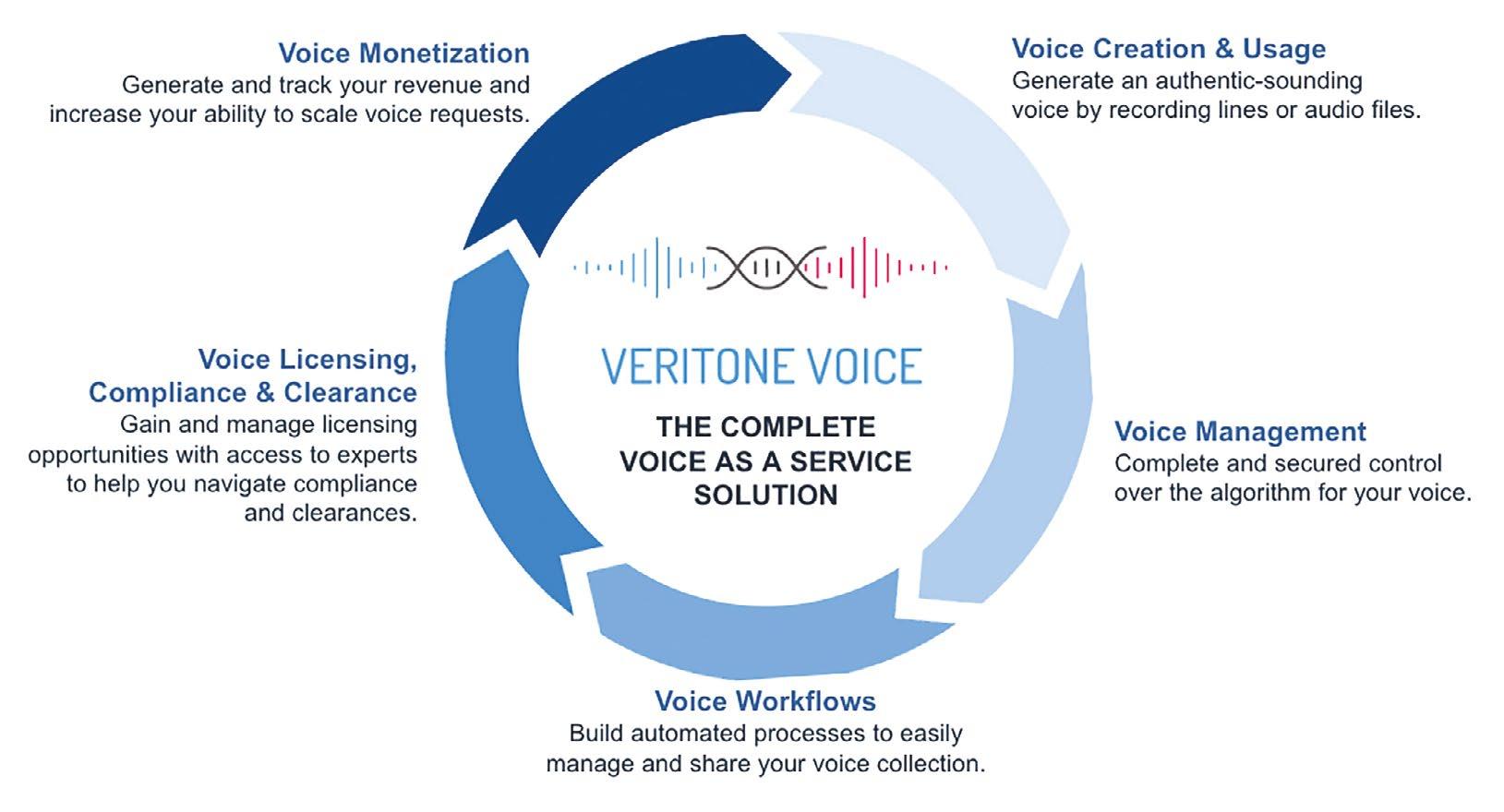
4 minute read
Veritone synthetic voice gets an audition
Writer
Randy J. Stine
Radio World’s lead news contributor wrote about radio’s new hybrid workflows in July.
Veritone synthetic voice gets an audition
iHeart to use voice cloning AI to translate podcasts
iHeartMedia’s plan to use Veritone’s voice-cloning technology for its podcast platform has some radio industry observers asking the obvious questions: How good does it sound and is broadcast radio far behind?
The largest radio company in the United States says that for now, the synthetic voice solution will only be used to translate podcasts from English to other languages for use on the iHeartPodcast Network, first for Spanish-speaking audiences. But Veritone officials confirm its technology could someday be used for advertising to reduce timeto-market and production costs for radio.
One veteran broadcast engineer said Veritone’s voice cloning product is exactly the sort of tech breakthrough that media are quickly adopting as the industry embraces cost-saving measures, and could at the very least bring a more centralized approach to commercial production and staffing by leveraging artificial intelligence.
There are literally dozens of examples of text-to-speech apps available commercially, many of which can convert text into human-like speech, even if it still might sound a bit robotic or unnatural. Observers familiar with this technology say some of the services on news websites are becoming good enough to be “almost indiscernible from real human voices.”
But what Veritone and iHeartMedia are trotting out appears to be an effort to take synthetic speech and voice cloning to another level, according to those familiar with the AI platform.
Veritone says “hyper-realistic custom voice clones” will offer increased revenue streams for


branded synthetic voices of top talent — imagine the cloned voice of Ryan Seacrest someday pitching for the local hardware store.
Veritone launched Veritone Voice in 2021, saying it has the ability to “control and manage the entire voice creation lifecycle for efficiency and scale.” The company says its synthetic voice solution will afford iHeartMedia the opportunity to reach new audiences at scale with their current top podcast talent.
“With no additional studio time, voice talent can authorize Veritone’s synthetic voice solution to automatically produce more podcasts, advertisements and additional audio in multiple languages with the same energy, cadence and uniqueness of top talent,” the technology company says.
Veritone, which reported its first quarterly profit in Q4 2021, says its cloning software ingests several hours of audio that uses AI to train the system on how to produce the synthetic voice. “The more audio, the more life-like the results,” its executives say (see sidebar on page 8).
CEO Chad Steelberg said on an earnings call this year that in addition to the iHeart agreement, the AI company is inking deals in a number of voice markets beyond podcasting like audio books, production studios, audio advertising and digital influencers.
Veritone has been aggressively pursuing tech startups specializing in synthetic voice development, according to its press releases. Its recent acquisition of VocaliD will “further enhance the company’s existing synthetic voice offerings for commercial enterprise including brands, podcasters, broadcasters, studios, publishers and corporations,” according to Veritone.
Conal Byrne, chief executive officer at iHeartMedia Digital Audio Group, says the media company is in the “test phase” of using voice cloning to translate podcasts from English to multiple other languages.
The company says it plans to use Veritone’s technology to allow celebrities, athletes, influencers, broadcasters, podcasters and other talent to create and monetize synthetic voices that can be transformed into different languages, dialects and accents for its podcast network.
“This is really about audience expansion,” Byrne said. “The artificial intelligence that very smart people are working on to power voice technology is progressing a mile a minute. And in a lot of ways it is going to explode open the audience of podcast creators and broadcast radio influencers. The more we look into voice technology, the more we see it accelerating audience growth.”
Byrne says iHeart will be “careful and respectful” of creators’ voices. “Nothing will happen without the creators’ approval, input and collaboration, as it should be with any new technology.”
HD MULTICAST+MULTICAST+
Combined Importer/Exporter with optional Orban audio cards

Above A Veritone promotional graphic highlighting its concept of “Voice as a Service.”
Below Conal Byrne
Text-to-speech technology is now to the point that anything that is text-based is convertible or will be convertible, Byrne said.
“Anything you can read is now convertible into audio. That interests us since we are an audio company. That brings us a lot of really interesting opportunities when it comes to people’s audio journey. The world is going to audio.”
It is not clear yet whether iHeart’s podcast platform will disclose to audiences in advance of programming that synthetic voice is in use.











